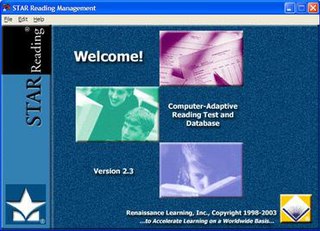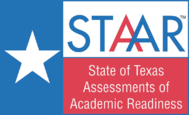
Phonics is a method for teaching people how to read and write an alphabetic language. It is done by demonstrating the relationship between the sounds of the spoken language (phonemes), and the letters or groups of letters (graphemes) or syllables of the written language. In English, this is also known as the alphabetic principle or the alphabetic code.

A standardized test is a test that is administered and scored in a consistent, or "standard", manner. Standardized tests are designed in such a way that the questions and interpretations are consistent and are administered and scored in a predetermined, standard manner.
Test of English as a Foreign Language is a standardized test to measure the English language ability of non-native speakers wishing to enroll in English-speaking universities. The test is accepted by more than 11,000 universities and other institutions in over 190 countries and territories. TOEFL is one of several major English-language tests worldwide, including IELTS, Duolingo English Test, Cambridge Assessment English, and Trinity College London exams.
DIBELS is a series of short tests that assess K-8 literacy.
The New England Common Assessment Program was a series of reading, writing, mathematics and science achievement tests, administered annually, which were developed in response to the Federal No Child Left Behind Act. Starting in 2005, school students in New Hampshire, Rhode Island, and Vermont participated in NECAP, and Maine joined the assessment program in 2009. It was a collaborative project of the New Hampshire, Rhode Island and Vermont departments of education, with assistance from the National Center for the Improvement of Educational Assessments. Measured Progress, an assessment contractor from Dover, New Hampshire, coordinates production, administration, scoring and reporting.
The Iowa Tests of Educational Development (ITED) are a set of standardized tests given annually to high school students in many schools in the United States, covering Grades 9 to 12. The tests were created by the University of Iowa's College of Education in 1942, as part of a program to develop a series of nationally accepted standardized achievement tests. The primary goal of the ITED is to provide information to assist educators in improving teaching.
The New Jersey Assessment of Skills and Knowledge (NJASK) was a standardized test given to all New Jersey public-schooled students in grades 3-8 during (usually) March, April, or May, and was administered by the New Jersey Department of Education.
The Secondary School Admission Test (SSAT) is an admission test administered by The Enrollment Management Association in the United States to students in grades 3–11 to provide a standardized measure that will help professionals in independent or private elementary, middle, and high schools to make decisions regarding student test taking.

STAR Reading, STAR Early Literacy and STAR Math are standardized, computer-adaptive assessments created by Renaissance Learning, Inc., for use in K–12 education. Each is a "Tier 2" assessment of a skill that can be used any number of times due to item-bank technology. These assessments fall somewhere between progress monitoring tools and high-stakes tests.
In an educational setting, standards-based assessment is assessment that relies on the evaluation of student understanding with respect to agreed-upon standards, also known as "outcomes". The standards set the criteria for the successful demonstration of the understanding of a concept or skill.
The Pennsylvania System of School Assessment (PSSA) is a standardized test administered in public schools in the state of Pennsylvania. Students in grades 3-8 are assessed in English language arts skills and mathematics. Students in grades 4 and 8 are also assessed in skills relating to natural science, including the field of data interpretation and analysis. Since 2013, high school students have taken the Keystone Exam in place of the PSSA for their standardized testing. The PSSA's were made by a company in New Jersey. The PSSA is written, owned and administered by Pearson Education. There are reporting categories for each subject which list eligible content to be tested in each grade. Assessment Anchors specify what is considered eligible content for each grade level tested. A Proficient or Advanced level is needed to be able to qualify as passing the PSSA.

Reading is the process of taking in the sense or meaning of letters, symbols, etc., especially by sight or touch.
The Lexile Framework for Reading is an educational tool that uses a measure called a Lexile to match readers with books, articles and other leveled reading resources. Readers and books are assigned a score on the Lexile scale, in which lower scores reflect easier readability for books and lower reading ability for readers. The Lexile framework uses quantitative methods, based on individual words and sentence lengths, rather than qualitative analysis of content to produce scores. Accordingly, the scores for texts do not reflect factors such as multiple levels of meaning or maturity of themes. Hence, the United States Common Core State Standards recommend the use of alternative, qualitative methods for selecting books for students at grade 6 and over. In the US, Lexile measures are reported from reading programs and assessments annually. Thus, about half of U.S. students in grades 3rd through 12th receive a Lexile measure each year. In addition to being used in schools in all 50 states, Lexile measures are also used outside of the United States.
The Common Core State Standards Initiative, also known as simply Common Core, is an educational initiative from 2010 that details what K–12 students throughout the United States should know in English language arts and mathematics at the conclusion of each school grade. The initiative is sponsored by the National Governors Association and Council of Chief State School Officers.

The State of Texas Assessments of Academic Readiness, commonly referred to as its acronym STAAR, is a series of standardized tests used in Texas public primary and secondary schools to assess a student's achievements and knowledge learned in the grade level. It tests curriculum taught from the Texas Essential Knowledge and Skills, which in turn is taught by public schools. The test used to be developed by Pearson Education every school year, although the most recent contract gave Educational Testing Service a role in creating some of the tests, under the close supervision of the Texas Education Agency.
Common Educational Proficiency Assessment (CEPA) is a set of locally-developed standardized tests used for admissions and placement by three federal institutions of higher education in the United Arab Emirates. The tests are produced by the UAE Ministry of Higher Education and Scientific research as part of the National Admissions and Placement Office (NAPO) and administered in the three federal institutions. Around 17,000 grade 12 Emirati students take the tests each year. There are two CEPA exams. CEPA-English tests basic English proficiency, and CEPA-Math measures basic math skills. Both exams are administered in two formats: paper-based and computer-based.
The Peabody Individual Achievement Test is a criterion based survey of an individual’s scholastic attainment. It can be administered to individuals between the ages of five and 22 years of age, and returns a grade range between Kindergarten and grade 12. The test is available in English and Spanish.

In the United States, elementary schools are the main point of delivery of primary education, for children between the ages of 4–11 and coming between pre-kindergarten and secondary education.
ACT, Inc. is an American 501(c)(3) nonprofit organization, primarily known for the ACT, a standardized test designed to assess high school students' academic achievement and college readiness. For the U.S. high school graduating class of 2019, 52 percent of graduates had taken the ACT test; the more than 1.78 million students included virtually all high school graduates in 17 states.





